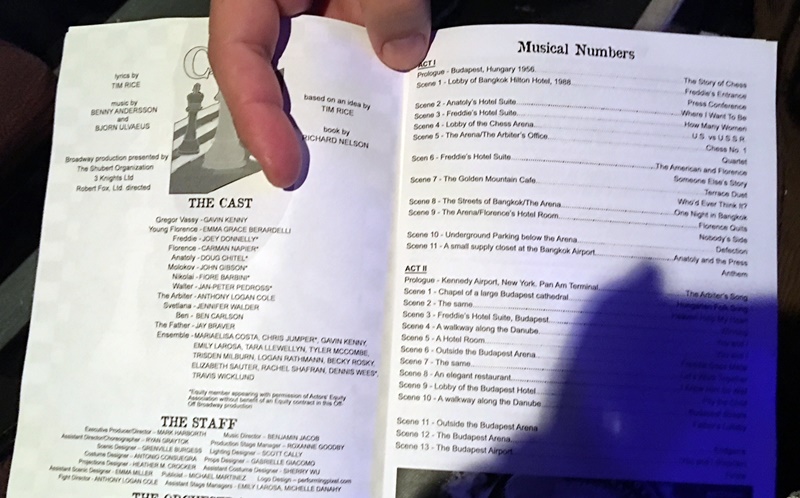5.13.18 How a musical called ‘Chess’ keeps making all the wrong moves after 34 years
Chess is not a great musical. It is not even one of Tim Rice’s greatest musicals. But if you’ve ever heard “One Night in Bangkok” or “I Know Him So Well,” you know this: it’s got some pretty awesome 1980s-era pop music. And I love it dearly.
How could I not? Along with Rice, the musical’s two other co-authors are members of ABBA (Benny Andersson, Bjorn Ulvaeus), and based on the soundtrack – which was all I had to listen to for years, until a version came to Broadway – there was some terrific, pointed commentary on politics, greed, selling out and relationships.
But I didn’t see the musical for many years. And now having seen it twice, I have to say: I still do not think I’ve seen the musical.
To explain: There is a British version, which heavily relies on the Cold War gamesmanship between the US and the (then) USSR. Clearly, everyone is drawn in broad brushstrokes: The American is brash, doesn’t play by the rules, loud and obnoxious. The Russian (who is more sympathetic and becomes the ostensible romantic hero) has a short Soviet leash on him, and even his chess second is a KGB agent. The American’s second (Florence) is a woman who escaped Hungary as it was being invaded by the Soviets in the 1950s, and grew up in America, but never knew what happened to her father. The American and the Russian are going head-to-head in a chess match, sparks fly, Florence defects to the Russian, the Russian defects to America. Things go downhill from there. Much of this is spelled out in the soundtrack, where the songs seem to spell out the story fairly clearly.
There is an American version, however, which came to Broadway and conflated the romantic story while downplaying the political story. Songs were dropped. Others added. Characters added. Characters lost. This was done for Reasons, but they were bad reasons, something I didn’t realize until I actually coughed up Broadway money to see the show with some friends in 1988. We’d had the soundtrack for at least four years by then, and we knew virtually every word. We would know where it was changed.
And we left, dejected and irritated. This was not our Chess.
Then my husband saw that a local production was being mounted in Brooklyn this spring, so after reading that the director was blending the American and British versions, I thought: OK, mistakes will be rectified. I will finally get to hear “Embassy Lament” and “Merano.” We went on Saturday night.
Suffice it to say that we did not hear “Embassy Lament” or “Merano.” In fact, if it was possible, this version was even worse than the Broadway version. (This is not about the acting or staging, though much could be said in those areas.) The story is now utterly ridiculous and the characters have no idea what they’re doing or why.
Herewith, a few thoughts and notes from what I saw Saturday, as a reminder – if nothing else – why I will not watch this musical ever again, unless I’m seeing the British version:
* Our brash obnoxious American is actually named Freddie Trumper. I would have thought they’d altered his last name to be a little too on-the-nose, but this makes me think that the authors knew something we didn’t realize yet.
* Then again, the KGB agent’s last name is “Molokov,” which sounds a lot like “Molotov” and maybe they were just a little obvious about things.
* The British version begins in the northern Italian town of Merano, and then shifts to Bangkok in the second act. The American version goes from Bangkok to Budapest, the latter so that we may have So Much Drama about Florence and her missing dad. If done well, I could see this as being a valid dramatic point. It is not (see more below).
* By omitting Merano, we completely lose the gangbuster opening number of “Merano,” which starts bucolic and sweet and innocent and almost The Sound of Music-like, then crashes awake into straight-up rock once Trumper shows up. It’s a brilliant way to introduce most of the main characters and the tone, and sets the stage perfectly. Instead, the version I saw Saturday starts with Florence being torn from her father’s arms and we hear a truncated version of “The Story of Chess.” Because sure, let’s start with a flashback and a history lesson, before we even get to the metaphorical use of chess moves. Already, we’re in trouble.
* Tossing out “Embassy Lament” and “Opening Ceremony’s” merchandisers means we lose texture and context: chess becoming a worldwide sporting event as eagerly anticipated as the World Cup (OK, so this is something of a fantasy) and therefore sold within an inch of its life. This is good stuff, this is relevant stuff
* Instead, within the space of a single song, we go from Florence and the Russian (Anatoly) getting stuck with one another and exchanging yawns alternately with barbs – to them playing tonsil hockey on the balcony. It’s the most unconvincing love story I’ve ever seen unspool, and continues to be so throughout the production. Who cares about them being in love? The real relationship I want to see – the one that throws sparks – is the one between the competitors.
* In the British version, Freddie is like Whac-A-Mole: despite having lost to the Russian, he comes back the next year in Bangkok, sings the hit tune and then proceeds to undermine (with the help of the KGB, which is pissed off that the Russian defected) Anatoly’s defending his title. This leads to fucking around with Florence’s mind, too, thanks to news about her father that has suddenly surfaced. It’s subtle and about mind games more than anything else, and you can see how each person’s selfishness ends up ruling them, and ruining them. In this context, we care a bit about Freddie, and maybe a little about how his childhood set him up to be the jerk he currently is. So we don’t mind when things take a break and he sings “Pity the Child.”
* In the American version, the match goes to two cities, always between Freddie and Anatoly, but after the love story/where’s my dad story takes over Freddie becomes basically a nonentity. He has no purpose, he has no story arc, and when we hear him sing “Pity the Child,” we no longer care. They basically drop one of their protagonists, mid-show.
* Meanwhile, in the British version Florence’s father is revealed to have been a collaborator rather than a hero; in the American version he’s an old man she has a brief reunion with (despite the fact that it hardly seems they recognize one another) and learns later he was just an actor. The whole thing ends with Anatoly going back to Russia so that she can bring her father to America – but she gets this final fuck-you from the Soviets after Anatoly has already left. And then it ends. It ENDS with her on her knees on the floor, basically singing “now what do I do?”
* This doesn’t even take into account the numerous lyric changes and swap-outs; tin-eared and otherwise. Florence and Anatoly meet in the Golden Mountain cafe in Bangkok and multiple jokes are made about Bangkok being a surprising place for mountains, then the sung line about “wasting my time on mountains with you” isn’t even used. The song is called “Mountain Duet” and is changed to “Terrace Duet.” Later, in “You and I,” a line about “but we go on pretending/stories like ours have happy endings,” which is really the most existential and sad lines in the whole production, is first sung as “but we go on believing/nothing can harm us; this is forever” which doesn’t even rhyme and to those of us who know the soundtrack is the aural equivalent of hearing the Beatles sing “I wanna hold your foot.”
* Three notes on the Brooklyn version. One: In the 1980s, did Dannon actually have those individual yogurt cups? Did we all use disposable plastic water bottles? Just asking. Two: Is it so hard for actors to use their arms to emote with a bit while singing? I swear, I felt like I was being sung at rather than hearing emotions transformed into music. Three: This is freakin’ Brooklyn. Are you telling me not one person of color was worthy of hiring for an on-stage appearance? (Yes, I think one actress may have been Latina. Still, terrible batting averages.)
Ultimately, I could deal with the less-than-believable love story, but I need the leavening of the cynical political story to do so. I don’t care about Florence’s father, I really don’t. I want the good songs, not bad versions of them. I don’t need extra characters. I don’t need the press as a Greek chorus. And I got all of those things in Brooklyn on Saturday night.
One last thing, and I’ll wrap up this rant: I hear Chess may be coming back to Broadway in a revived edition – it just got a revival in London that I’ll be missing by about a month and a half, to my great dismay. But if what shows up on Broadway is anything like what I just saw in Brooklyn, I’ll be saving my money. And you should, too. Demand the original! I haven’t yet seen it, but I just know it’s the best.
xo,
R
Like what you’re reading? Donate here!
WANT TO KNOW MORE?
SIGN UP FOR MY BEAUTIFUL AND TALENTED NEWSLETTER!
CLICK ABOVE, OR SCAN THIS QR CODE BELOW WITH YOUR PHONE:





